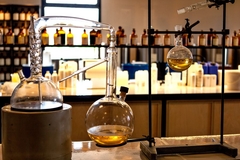August in review: Avon Products in bankruptcy, weak cosmetic demand in China and Germany’s “pragmatic” PFAS approach

02 Sep 2024 --- In August, Avon Products filed for bankruptcy, while cosmetic powerhouses such as Beiersdorf, Estée Lauder and LVMH-owned Sephora warned of weaker demand in China’s premium beauty market. However, ELF Beauty continued to push ahead with soaring sales in its latest quarter and Ulta Beauty missed estimates but attracted legendary investor Warren Buffett.
Evonik told Personal Care Insights it welcomed German Chancellor Olag Sholz’s promise to take a “pragmatic approach” to the EU’s restriction proposal. At the same time, the UK said it would soon ban the supply and sale of wet wipes containing plastic amid concerns that the product will break down into microplastics over time. Another report from the UK also showed that the beauty sector is dominating growth in the region.
In innovation news, scientists from Vienna, Austria, told us they developed a tool that could help identify “blind spots” in the chemical space to support the global push toward eliminating animal testing.
Learn more about the significant stories last month that made headlines in the personal care and beauty sector.
August
UK government’s impending ban on plastic-based wet wipes has industry and consumers talking
The UK said it would ban the supply and sale of wet wipes containing plastic. Research shows wet wipes break down into microplastics over time, harming human health and ecosystems. The government cited a survey that showed an average of 20 wet wipes per 100 meters of beaches across the UK from 2015 to 2020. The new legislation will be introduced across all four nations and is expected to be ready by the end of the year, with the ban enforced 18 months later.
China luxury slump weighs on Beiersdorf profits despite sales growth
Strong sales of Nivea in the first quarter boosted Beiersdorf’s future outlook for sales. Organic sales from its main business — which centers around skin and body care products — soared thanks to the skin cream’s popularity. CEO Vincent Warnery said the “positive results more than offset the recurring headwinds in the challenging luxury market, which were particularly evident in China.” Evonik told us it welcomed the German Chancellor’s “pragmatic approach” to the EU’s PFAS restriction proposal.
Evonik told us it welcomed the German Chancellor’s “pragmatic approach” to the EU’s PFAS restriction proposal.
ELF Beauty sees sales soar 50% but warns of potential Trump presidency price impact
ELF Beauty reported a 50% jump in first-quarter net sales to US$324.5 million thanks to strength in retail and e-commerce channels. Chairman and CEO Tarang Amin said it is the “22nd consecutive quarter of net sales growth and market share gains — putting ELF Beauty in a rarified group of high-growth consumer companies.” However, Amin warned of price hikes if presidential candidate Donald Trump wins the US general election this November, pointing to Trump’s planned taxes on goods imported from China.
BASF warns aroma ingredients supply will be tight for months due to fire and will focus on biotransformation at Europe’s biggest chemical site
BASF declared force majeure on two ingredients in its Personal Care portfolio after a recent leak of an organic solvent led to an explosion and subsequent fire at its site in Ludwigshafen, Germany. The company told Personal Care Insights that the supply would be tight for months and was “proactively informing customers of potential shortages.” BASF also said it would move toward biotransformation of its (meth)acrylate portfolio and switch its production to bio-based ethyl acrylate — made in Ludwigshafen — later this year.
Avon Products files for bankruptcy to tackle scores of talc lawsuits with cancer claims
Once famous for its door-to-door cosmetics sales, Avon Products filed for Chapter 11 bankruptcy protection at the US Bankruptcy Court of the District of Delaware. Brazilian beauty conglomerate Natura & Co acquired the company four years ago but filed for bankruptcy due to pandemic pressures and scores of lawsuits alleging its talc products caused cancer. Since its first talc claim in 2010, Avon has faced nearly 400 lawsuits. A spokesperson emphasized that “Avon, the brand, and the non-US operations worldwide…did not file for Chapter 11.”
Sephora job cuts in China signal tighter retail spending in leading beauty market
Just days after Estée Lauder Companies warned of “ongoing softness” in China’s prestige beauty market, Sephora said it would cut its China-based workforce by about 120 jobs as local consumers tightened spending on skin care and makeup. The LVMH retailer acknowledged it was a “challenging market environment” and that the move would affect less than 3% of the workforce, but some reports suggested it would be closer to 10%. Cosmetic companies, including LVMH-owned Sephora, warned of weaker demand in China (Image credits: Sephora).
Cosmetic companies, including LVMH-owned Sephora, warned of weaker demand in China (Image credits: Sephora).
Recovering UK beauty industry approaches pre-COVID economic peak but grapples with EU trading red tape
The British Beauty Council and Oxford Economics released a report indicating the UK beauty sector is close to its 2019 peak economically, despite structural and economic challenges. The data suggested that the industry’s direct contributions increased by 11% in 2023 or 3%, after adjusting for inflation. Overall sector growth was boosted by high inflation, which is expected to cool down in the months ahead. Still, Oxford Economics predicts growth of 3% next year — far higher than the 1% average for the overall UK economy.
Scientists say machine learning may accelerate global ban on animal testing outside EU
Scientists from the University of Vienna, Austria, developed MolCompass to identify “blind spots” in the chemical space to support the global push toward eliminating animal testing. Personal Care Insights talked to senior scientist Sergey Sosnin of the university’s Pharmacoinformatics Research Group. He urged personal care companies to integrate MolCompass in testing compounds, as he believes MolCompass increases confidence in machine learning predictions.
Evonik welcomes commitment of German Chancellor’s “pragmatic approach” to PFAS
Evonik hosted Olag Sholz at its facility in Marl, Germany and told Personal Care Insights that it welcomed the German Chancellor’s “pragmatic approach” toward the EU’s proposed ban on PFAS. Scholz told reporters he would not “hinder Germany’s industrial development” but promote it. The specialty chemical company said it wants to see “balanced regulatory measures for PFAS [since] the new restriction proposal would lead to value chain disruptions and seriously impact important applications.”
Ulta Beauty misses earnings estimates after reporting drop in demand
Ulta Beauty fell short of Wall Street’s quarterly performance estimates, citing growing market competition from the diversifying omnichannel playing field, particularly for premium beauty. The highly-anticipated report was released just days after filings revealed that Warren Buffett’s conglomerate, Berkshire Hathaway, purchased about 690,000 Ulta Beauty shares last month, worth about US$266 million.
By Anita Sharma













